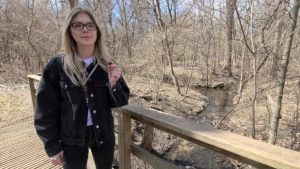Making local park national draws mixed opinions

Park visitor Sarah Woolson is shown here. (Photo by Tyler Clapp)
The idea of nationalizing Ojibway Park draws mixed feelings from visitors and environmentalists.
Visitor Sarah Woolson said variety is what draws her to Ojibway Park.
“Compared to the other parks around here, it definitely has the most diversity and the animals here are definitely more comfortable with people,” said Woolson.
Ojibway Park has roughly 119 rare plant species found only at this location, along with an estimated 3,000 insect species. It is also part of the Ojibway Prairie Complex, a collection of natural areas including Tallgrass Prairie Heritage Park, Black Oak Heritage Park and Spring Garden Natural Area.
While there is no official plan to change the park’s status, nationalizing other local areas is not new. Windsor West MP Brian Masse dedicated a petition to nationalize Ojibway Shores, which has over a thousand signatures.
Woolson also said she thinks nationalizing could make mixed results.
“Obviously, I think it would be great because more people would have the experience of coming here. More people would hear about it. But at the same time, it might kind of taken over and the animals might not be as comfortable anymore,” said Woolson.
Some criteria the federal government uses in creating a national park includes the ecological health of the area and the implications for Aboriginal rights.
Derek Coronado is the coordinator of the Citizens Environment Alliance of Southwestern Ontario, a provincial non-profit addressing environmental issues. He said the federal government can provide the park more than it has now.
“That’s the biggest factor, the amount of financial and human resources the federal government can bring,” said Coronado.
One such example is the rescue of over 750 turtle eggs by the federal government in a series of national parks located in Tobermory.
Despite this, he also said there were drawbacks too.
“There’s a possibility that more infrastructure could be added to the park system to accommodate an increase in visitors, which would be really unfortunate because the human footprint on Ojibway is already large now,” said Coronado.
Parks Canada has come under criticism from trends like focusing on tourism over conservation and making decisions conflicting with laws based on protecting the environment.
Woolson also said Ojibway Park’s local status is what makes it unique.
“It’s super personal now, only a few select people from this area come here and I think that’s what makes it so special.”


